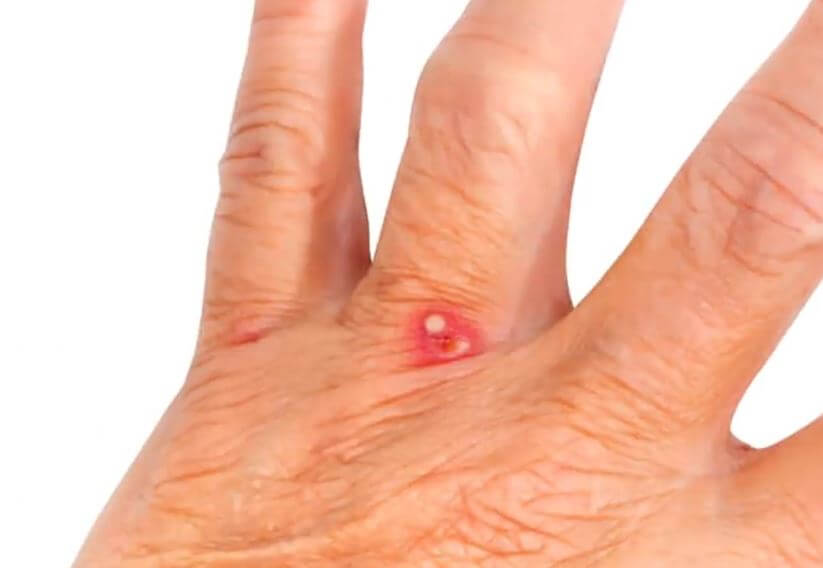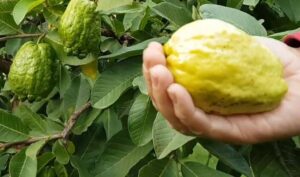In this guide, we are going to focus on providing you information about guava allergy and symptoms plus what you can do to manage the allergy.
Short answer: guava allergy is an immune response or reaction that occurs when someone comes in contact with or eat guava. Guava allergy is like any other fruit allergy, however, allergy to guava is very uncommon in the medical literature. Symptoms of allergic reactions include redness, inflammation, itchiness, and bumps.
Keep reading to find out more information about allergy due to guava.
Overview
Guava fruit is quite delicious and is an excellent fruit with abundant important nutrients and with proven health benefits.
More importantly, the leaves are even more nutritious and beneficial than fruits. Find out more information about the health benefits of guava fruits and leaves.
However, few people were found to develop guava allergic reactions. Despite not available study supporting the allergenic effect of guava fruit but there were some evident reports that may potentiate the effects of guava fruit to cause allergy.
In order to make things easy to understand and digestible, we are going to discuss the topic under the following subheadings:
- Guava allergic reactions
- Guava leaves and allergic reactions
- Guava fruit allergy
- Guava allergy symptoms
- Allergy to guava effects
- Guava allergy treatment
- Guava cross allergy home remedies
Guava Allergic Reactions
An allergic reaction is a defense immune responses against foreign bodies such as harmful chemicals and certain foods when your body comes in contact with them or when you eat them. These chemicals and foods that trigger allergic responses are called allergens. The most common plant allergens are pollen and latex.
Fruit allergy is one of the uncommon food allergies that is rarely seen among people. Basically, there is an antibody called IgE cells, which is sensitive to a particular protein. If you have this antibody in your body system and you then happen to eat any food or fruit that contains this protein, your body will be sensitive to this fruit or food.
Common foods that IgE antibodies are sensitive to them are nuts and certain fruits such as pear. Allergic reactions due to guava is very rare but that will be discussed later.
For now, let us look at the role guava leaves can play in treating and causing allergic reactions. This is because if left without explanation, some may be wondering why something that can be used to treat allergy is also said to cause allergy.
Guava Leaves And Skin Allergy
Guava leaves are commonly used to treat skin allergy. This is due to the antiinflammatory and wound healing property of guava leaves.
However, few people were found to develop allergic reactions from using guava leaves. And these people include people with underlying medical conditions such as anaphylaxis and Eczema.
One 2001 report showed that guava leaf tea caused allergic contact dermatitis.
And those people who fail to wash the leaves before boiling or blending may also experience allergic reactions. This is because they may use leaves that contain allergens such as latex and pollen.
Guava Fruit Allergy
Guava fruit allergy is very rare in the medical literature. To date, there is not a complete research-backed study that reported guava fruit allergy.
However, only a few cases were seen among patients with underlying medical conditions.
One anecdotal evidence suggested that guava may occasionally induce some symptoms of food allergy in people who are sensitive to guava.
Additionally, one 2005 study made to find the effects of avoidance of food allergens among 24 children with childhood asthma that are within the age range of 3 to 15 years found 79% of these children possess specific IgE targeted to guava.
One survey of 800 patients involving 410 males and 390 females that were reported to the Allergy Unit of the Institute of Child Health, Calcutta, showed that out of the 123 patients tested for sensitization to guava, 25% (31) of the patients were found to be positive.
Causes of Guava Allergy
The most common factors that may cause guava allergy include:
- Underlying medical conditions
- Using guava fruit or leaves that conatin latex and pollen
- Eating guava fruit with worm inside
- Genetics
- Faimly History
Guava Allergy Symptoms

The common symptoms of guava allergy include:
- Hives
- Eczema
- Rashes
- Sweling of throat
- Redness
- Swelling of face
- Vomiting
- Nausea
- Constipation
- Itching
- Diarrhea
Guava Allergy Effects
The common effects of an allergy to guava are poor academic performance, restlessness, mouth swelling, itching, loss of balance, and hypertension.
Guava Allergy Treatment
Common treatment options include:
- Use of topical steroidal creams and ointments
- Use of antihistamines
- Avoid eating guava fruit
Guava Allergy Home Remedies
When you understand that you are allergic to guava fruit or any guava product, the first and most important thing to do is to cross-check your all your diets. Find out the food or diet that contains guava products and immediately remove them from your diets.
Several research-backed studies have shown that people who develop an allergy to food have some unique antibodies called IgE antibodies.
One 2000 study found that most individuals suffering from atopic dermatitis (which is a form of allergic response) their serum samples have IgE antibodies. These IgE antibodies were shown to work against the body proteins. And this defense mechanism causes inflammatory skin responses.
Therefore, an effective way to treat allergy at home is to find a good herbal supplement that can tackle the autoallergens.
One 2003 study found that chamomile contains high amount of flavonoids, terpenoids, mucilages, monosaccharides, oligosaccharides, and antioxidants.
And these dietary antioxidants were shown to exhibit anti-inflammatory activity, quicken wound healing, help moisturize skin, help decrease pruritis and treat the signs of photodamage.
To use chamomile, you can make a DIY body moisturizer using 2% chamomile essential oil in coconut oil or with your favorite carrier oil.
Other home remedies include eating garlic cloves like 4-5 cloves.
Frequently Asked Questions
Is Guava Allergen?
Guava is generally not considered an allergen. But, allergy to guava may occur to people who are suffering from anaphylaxis. Some sources suggested that guava may sometimes induce food allergy symptoms in sensitized people. However, this is very rare.
What are the Side Effects of Guava?
Guava in itself is considered safe. However, taking too much of guava is found to cause bloating and constipation. Find out more information about the side effects of guava.
What is the Most Common Fruit Allergy?
A variety of different fruits were reported to cause fruit allergy. However, the most common fruits known to cause allergy are apples, kiwi, and peach.
What Fruits Cause Allergic Reactions?
The followings are some common fruits that cause fruit allergy: melon, oranges, banana, peach, apricot, cherry, kiwi, apples, pear, and plum.
Conclusion
We hope that you find this article useful. we would like to hear your questions and views in the comment section below.
Recommended reading:
>How To Tell If A Guava Is Bad
>Guava Leaves Tea Side Effects And How To Avoid Them
References
Obi, Mariko & Miyazaki, Yasuhiro & Yokozeki, Hiroo & Nishioka, Kiyoshi. (2001). Allergic contact dermatitis due to guava tea. Contact dermatitis. 44. 116-7. 10.1034/j.1600-0536.2001.44020917.x
Agarkhedkar SR, Bapat HB, Bapat BN. Avoidance of food allergens in childhood asthma. Indian Pediatr. 2005;42(4):362-366.
Mandal J, Das M, Roy I, Chatterjee S, Barui NC, Gupta-Bhattacharya S. Immediate hypersensitivity to common food allergens: an investigation on food sensitization in respiratory allergic patients of calcutta, India. World Allergy Organ J. 2009;2(1):9-12.
Baumann LS. Cosmeceutical critique: chamomile. Skin & Allergy News. 2003;34:43
Rudolf Valenta etal., 2000. Autoallergy: A pathogenetic factor in atopic dermatitis?. VOLUME 105, ISSUE 3, P432-437, MARCH 01, 2000
Stallings AF, Lupo MP. Practical uses of botanicals in skin care. J Clin Aesthet Dermatol. 2009;2(1):36-40.
Sussman D. Oral allergy syndrome. CMAJ. 2010;182(11):1210-1211. doi:10.1503/cmaj.090314
Kashyap RR, Kashyap RS. Oral Allergy Syndrome: An Update for Stomatologists. J Allergy (Cairo). 2015;2015:543928. doi:10.1155/2015/543928
Helmut Gall etal., 1994. Kiwi fruit allergy: A new birch pollen–associated food allergy. Journal of Allergy and Clinical Immunology |




